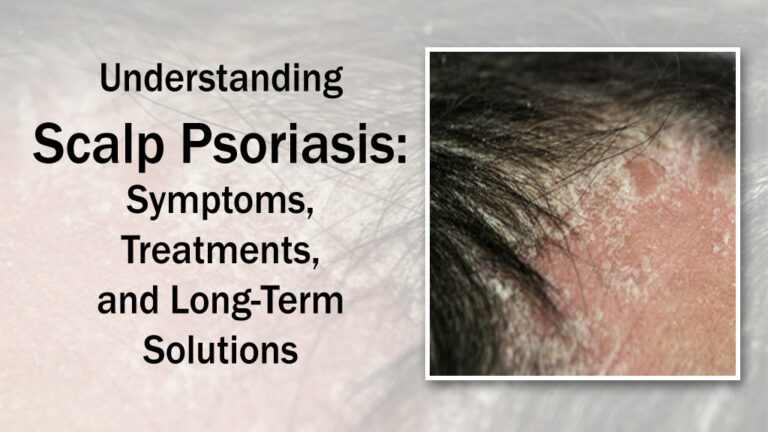Millions of people worldwide suffer from scalp psoriasis, a chronic autoimmune disorder that is inconvenient and frustrating for individuals who have it. In this piece, we examine the distinctions between dandruff and scalp psoriasis, look at several treatment approaches, and talk about methods for controlling and potentially even treating scalp psoriasis in the long run.
Table of Contents
ToggleUnderstanding Scalp Psoriasis vs. Dandruff:
Scalp Psoriasis:
Scalp psoriasis is characterized by the rapid growth of skin cells, leading to the formation of thick, red patches covered with silvery scales. These patches can be itchy, painful, and may even bleed when scratched. Unlike dandruff, which is often caused by excess oil production or a fungal infection, scalp psoriasis is an autoimmune disorder, meaning the body’s immune system mistakenly attacks healthy skin cells.
Dandruff:
On the other hand, dandruff is a common scalp condition characterized by flaky skin that sheds from the scalp. It is often caused by an overgrowth of yeast-like fungus called Malassezia, combined with factors such as oily skin, hormonal changes, or stress. Unlike scalp psoriasis, dandruff does not typically cause redness or thick patches on the scalp.
Scalp Psoriasis Treatment Options:
Topical Treatments:
Corticosteroids: These anti-inflammatory medications help reduce redness, itching, and inflammation associated with scalp psoriasis.
Salicylic Acid: Helps to soften and remove scales, promoting smoother skin.
Coal Tar: Slows down the rapid growth of skin cells and reduces inflammation.
Phototherapy:
UVB phototherapy involves exposing the scalp to ultraviolet light, which helps to slow down skin cell growth and reduce inflammation.
Systemic Medications:
To address the underlying immune system malfunction in severe cases of scalp psoriasis, physicians may use oral medicines or biologics.
Natural Remedies:
Aloe vera, coconut oil, and tea tree oil are among the natural remedies that some people find helpful in managing scalp psoriasis symptoms. However, it’s essential to consult with a dermatologist before trying any alternative treatments.
How to Cure Scalp Psoriasis Permanently:
While a long-term management strategy with a mix of medicines and lifestyle modifications is feasible, there is yet no recognized cure for scalp psoriasis:
Consistent Treatment: Follow your dermatologist’s prescribed treatment plan diligently to keep symptoms under control.
Stress Management: Stress can exacerbate scalp psoriasis symptoms, so finding effective stress-relief techniques such as meditation or yoga can be beneficial.
Healthy Diet: Some evidence suggests that a balanced diet rich in anti-inflammatory foods, such as fruits, vegetables, and omega-3 fatty acids, may help manage scalp psoriasis symptoms.
Avoid Triggers: Identify and avoid triggers that worsen your scalp psoriasis, such as certain skincare products, cold weather, or infections.
Conclusion:
Although scalp psoriasis can be difficult to live with, symptoms can be effectively managed with the correct treatment plan and lifestyle changes. People may take charge of their disease and enhance their quality of life by learning the distinctions between dandruff and scalp psoriasis, investigating several treatment choices, and putting long-term solutions into practice. For individualized guidance and treatment options catered to your unique requirements, never forget to see a dermatologist.
FAQs:
What are the key differences between scalp psoriasis and dandruff?
Scalp psoriasis is an autoimmune condition characterized by red, scaly patches, while dandruff is a common scalp condition involving flaky skin due to factors like oil production and fungal infections.
What are the most effective treatments for scalp psoriasis?
Topical treatments like corticosteroids and salicylic acid, phototherapy, systemic medications, and natural remedies such as aloe vera and coconut oil can help manage scalp psoriasis symptoms.
Is it possible to cure scalp psoriasis permanently?
While there is no known cure, long-term management is achievable through consistent treatment, stress management, a healthy diet, and avoiding triggers that exacerbate symptoms.
How does scalp psoriasis impact daily life and well-being?
Scalp psoriasis can cause discomfort, itchiness, and self-consciousness due to visible symptoms. Managing the condition effectively can improve quality of life and overall well-being.
What role does proper skincare and lifestyle play in managing scalp psoriasis?
Adopting a skincare routine suitable for sensitive scalp, avoiding harsh products, managing stress, maintaining a healthy diet, and identifying triggers are crucial in managing scalp psoriasis symptoms.








